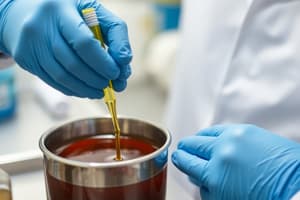Podcast
Questions and Answers
What is the purpose of Bartlett's Classification in a clinical microbiology laboratory?
What is the purpose of Bartlett's Classification in a clinical microbiology laboratory?
- To determine the antibiotic susceptibility of bacteria
- To collect urine specimens
- To identify the causative agent of UTI
- To assess the quality and scoring of sputum (correct)
What type of urine specimen is collected through a catheter?
What type of urine specimen is collected through a catheter?
- Midstream clean-catch urine
- Catheterized urine (correct)
- Suprapubic urine
- Random urine
Which of the following antibiotics is used to treat H. influenzae infections?
Which of the following antibiotics is used to treat H. influenzae infections?
- Bacitracin (correct)
- Ciprofloxacin
- Gentamicin
- Amoxicillin
What is the main difference between Lower UTI and Upper UTI?
What is the main difference between Lower UTI and Upper UTI?
What is the term for inflammation of the kidneys?
What is the term for inflammation of the kidneys?
What is the purpose of enumerating neutrophils and epithelial cells per low-power field in Bartlett's Classification?
What is the purpose of enumerating neutrophils and epithelial cells per low-power field in Bartlett's Classification?
What is the specimen of choice for bacterial culture?
What is the specimen of choice for bacterial culture?
Why is first morning urine preferred for bacterial culture?
Why is first morning urine preferred for bacterial culture?
What is the purpose of centrifuging urine in a laboratory?
What is the purpose of centrifuging urine in a laboratory?
What type of catheter is used for urine collection in those unable to produce a clean-catch urine sample?
What type of catheter is used for urine collection in those unable to produce a clean-catch urine sample?
What type of bacteria is often detected using India ink culture?
What type of bacteria is often detected using India ink culture?
What should be done to urine samples if they are not processed immediately?
What should be done to urine samples if they are not processed immediately?
What is the suitable preservative used to maintain accurate colony count in meningitidis?
What is the suitable preservative used to maintain accurate colony count in meningitidis?
What is the primary method of collecting urine specimens for UTI diagnosis?
What is the primary method of collecting urine specimens for UTI diagnosis?
What is the major cause of UTI?
What is the major cause of UTI?
What is the recommended time frame for culturing urine specimens?
What is the recommended time frame for culturing urine specimens?
What is the purpose of using a calibrated loop in colony count?
What is the purpose of using a calibrated loop in colony count?
What is the formula to compute for colony count per mL of urine?
What is the formula to compute for colony count per mL of urine?
What is the purpose of using 3-4 tubes for urine specimen collection?
What is the purpose of using 3-4 tubes for urine specimen collection?
What is the causative agent of UTI among sexually active young females?
What is the causative agent of UTI among sexually active young females?
Flashcards are hidden until you start studying
Study Notes
Urine Specimen Collection
- Midstream clean-catch urine is the specimen of choice for bacterial culture, as it is less invasive.
- Catheterized urine is used for those who are unable to produce a midstream clean-catch urine sample.
- Suprapubic aspiration is a method of collecting urine via needle aspiration above the symphysis pubis, and is an anaerobic process.
- First morning urine is ideal for bacterial culture as it is more concentrated.
Urine Specimen Handling
- Urine specimens must be preserved or refrigerated if not processed immediately, using a suitable preservative like boric acid to maintain accurate colony count.
- Urine specimens should be cultured within one hour or refrigerated, but not for longer than 24 hours.
Colony Count and Bacterial Culture
- Colony count should be performed on all urine samples, using a calibrated loop (1 μL or 10 μL).
- The formula to compute colony count per mL of urine is: No. of colonies x (1000 or 100) / volume of urine in μL.
UTI and Bacterial Causes
- The major cause of UTI is Escherichia coli.
- Staphylococcus saprophyticus is a common cause of UTI among sexually active young females.
- Lower UTI includes cystitis (bladder infection) and urethritis (urethra infection), while upper UTI includes pyelonephritis (kidney infection) and glomerulonephritis.
Clinical Specimen and Laboratory Procedures
- A combination of MAC and BAP is suitable for clinical specimens.
- Urine specimens are usually collected in 3-4 tubes, including one for chemistry, microbiology, hematology, and serology/microbiology.
- Tube #2 is for microbiology, gram stain, and culture, and should be examined immediately or held at 37°C storage temperature.
Studying That Suits You
Use AI to generate personalized quizzes and flashcards to suit your learning preferences.




